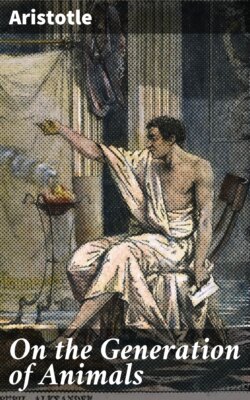Читать книгу On the Generation of Animals - Aristotle - Страница 6
На сайте Литреса книга снята с продажи.
Part 4
ОглавлениеTable of Contents
With regard to the difference of the spermatic organs in males, if we are to investigate the causes of their existence, we must first grasp the final cause of the testes. Now if Nature makes everything either because it is necessary or because it is better so, this part also must be for one of these two reasons. But that it is not necessary for generation is plain; else had it been possessed by all creatures that generate, but as it is neither serpents have testes nor have fish; for they have been seen uniting and with their ducts full of milt. It remains then that it must be because it is somehow better so. Now it is true that the business of most animals is, you may say, nothing else than to produce young, as the business of a plant is to produce seed and fruit. But still as, in the case of nutriment, animals with straight intestines are more violent in their desire for food, so those which have not testes but only ducts, or which have them indeed but internally, are all quicker in accomplishing copulation. But those which are to be more temperate in the one case have not straight intestines, and in the other have their ducts twisted to prevent their desire being too violent and hasty. It is for this that the testes are contrived; for they make the movement of the spermatic secretion steadier, preserving the folding back of the passages in the vivipara, as horses and the like, and in man. (For details see the Enquiries about Animals.) For the testes are no part of the ducts but are only attached to them, as women fasten stones to the loom when weaving; if they are removed the ducts are drawn up internally, so that castrated animals are unable to generate; if they were not drawn up they would be able, and before now a bull mounting immediately after castration has caused conception in the cow because the ducts had not yet been drawn up. In birds and oviparous quadrupeds the testes receive the spermatic secretion, so that its expulsion is slower than in fishes. This is clear in the case of birds, for their testes are much enlarged at the time of copulation, and all those which pair at one season of the year have them so small when this is past that they are almost indiscernible, but during the season they are very large. When the testes are internal the act of copulation is quicker than when they are external, for even in the latter case the semen is not emitted before the testes are drawn up.
